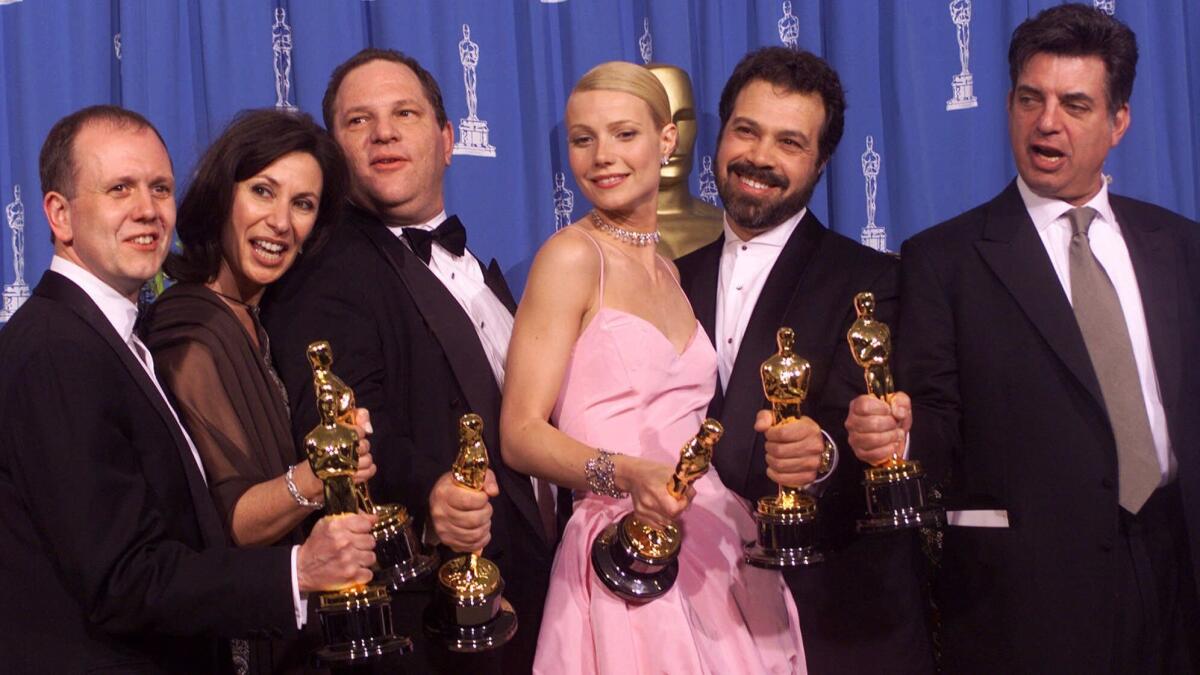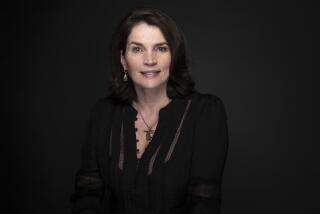The end of Harvey Weinstein and an industry that secretly loves its bullies

- Share via
The horrific allegations against Harvey Weinstein have summoned forth images that will play in our heads on a loop for days, months, maybe years. Those images — detailed with sickening exactitude in the pages of the New York Times and the New Yorker, and also in the harrowing personal testimonies that have emerged since — scarcely bear repeating here. But they are part of the reason why the courage of the women who have gone on the record so far can never be overstated.
I hope, but wouldn’t dare assume, that in sharing their stories, these survivors have begun to liberate themselves from the last vestige of Weinstein’s power to wound, humiliate and silence them. But their courage comes at a cost, as true courage always does. To reveal a history of sexual harassment and/or assault by one of the entertainment industry’s most powerful men is to relinquish one’s most private experiences to a public that salivates over every morsel of celebrity gossip, and that often responds to human pain with more cruelty than sympathy.
The infuriating instances of victim blaming we’ve heard so far — mostly, but not exclusively, from men who rarely examine the gift of their privilege — have borne this out. Weinstein may have been one of the more malignant offenders in an industry built on the everyday abuse and exploitation of women, but we risk turning cynicism into moral blindness if we suggest that this exploitation is a normal or acceptable state of affairs — as if part of the job of being an actress, or any woman in the movie business, is to submit to a certain degree of exploitation. Forget it, babe; it’s Hollywood.
The Weinstein accusations haven’t just created a host of terrible new images; they have also sullied some earlier ones. It’s all but unbearable now to watch a TV clip of an actress — be it Meryl Streep, Renée Zellweger, Jennifer Lawrence or someone else — standing in front of a microphone and thanking the room, especially when she gets around to thanking Harvey Weinstein. Those thanks are often followed by a quick cutaway to the man himself, sometimes beaming, sometimes looking curiously sphinx-like. When Streep hailed him as both “God” and “the Punisher” from the stage at the Golden Globes in 2013, the camera caught Weinstein grinning and shaking his head in mock shame.
Even before the extent of his abuses was revealed, there was always something vaguely ominous about those cutaways, simply based on the endless reports and rumors of Weinstein’s bullying ways. You didn’t have to know what went on in his hotel suite of horrors to suspect that his famous Midas touch, his knack for putting golden statuettes in the hands of talented people, had been the cause of significant grief.
Screaming obscenities at someone over the phone, verbally abusing a staffer in person or putting a journalist in a headlock, as Weinstein was known to do, may be far lesser crimes than victimizing women behind closed doors. But it’s worth asking why the industry condemns one form of bullying but tolerates and even secretly envies another, as if it were acceptable, even admirable, to behave monstrously so long as you’re wearing more than a bathrobe. Aren’t they both, in the end, indefensible abuses of power? And aren’t we complicit when we worship that power and treat it as something worthy of our fear and admiration?
Which of those outwardly smiling, Weinstein-thanking women knew or guessed the truth about his secret predilections — or worse, had experienced them firsthand? We have some of those answers, thanks to those who have come forward. But we scarcely need to know all of them to find the whole charade utterly toxic in its hypocrisy, to want to see the hideous, hollow pageantry of it all come crashing down.
One of the most telling details in the initial New York Times story comes from an interview with Ashley Judd, who — trapped in a room with Weinstein two decades ago — said that if he “wanted to touch her, she would first have to win an Oscar in one of his movies.” Judd said what she needed to say to stay safe and make her escape. But it’s remarkable how her bluff so pinpointed the twisted logic of Weinstein’s manipulations, his belief that a woman’s body and her career are equivalent bargaining chips.
The ugliness of that logic is laid bare in the case of Gwyneth Paltrow, one of several actresses who was believed to have owed her career to Weinstein, when all she really owed him was her outrage. When Paltrow accepted her Oscar for “Shakespeare in Love” in 1999, she wore a bright pink dress and gave an intensely emotional speech, and was later widely ridiculed for both. That derision struck me as more than a little misogynistic at the time, though nowhere near as misogynistic, in retrospect, as the sexually rapacious mogul she felt obliged to praise.
That was a triumphant night for Weinstein, who took the stage with his fellow producers when “Shakespeare in Love” pulled off its surprise best picture win over the heavily favored “Saving Private Ryan.” The upset was the culmination of an unprecedented publicity blitzkrieg, a war waged at swanky galas, in gossip-filled screening rooms and in splashy ads placed in the trade publications. It single-handedly announced that a dirtier, nastier and vastly more expensive era of Oscar campaigning had arrived, with Harvey Weinstein as its ringmaster, its screaming, bullying vulgarian poster child.
I mention the Academy Awards not to trivialize the suffering that will be remembered as Weinstein’s truest legacy, but because those awards are, for better or worse, an inextricable part of that legacy. We often talk about the difficulty of separating the art from the artist, and it pays to consider the problem of separating the producer from his product.
Weinstein all but invented the modern Oscar campaign, that red-carpeted roller-coaster ride that stretches from film festivals worldwide to Hollywood Boulevard, and that for months and months consumes the energies of the industry and the media assigned to cover it.
It’s hard, writing this, not to feel personally sullied as a film journalist, which is to say a participant — a sometimes grudging, unwilling one, but a participant nonetheless — in the self-promoting, truth-concealing Hollywood machinery that Harvey Weinstein helped create. But then again, I think I would feel sullied not just as a journalist but as a film lover, someone who deeply cherishes the escapist fantasy of the movies — including several Weinstein-produced movies (I adore “Shakespeare in Love,” damn it) — and is suddenly reminded of what that fantasy is often hiding.
It was Weinstein’s genius for the system that ultimately earned him his fame, his power, his currency. And it was the gradual devaluing of that currency in recent years that, as many have suggested, allowed his abuses to be brought into the open. That’s why it feels so significant that the Academy of Motion Picture Arts and Sciences decided on Saturday to expel Weinstein from its ranks.
It wasn’t a surprising outcome, given the vehemence with which some members, most vocally past academy president Sid Ganis, had expressed their disgust with Weinstein. (It feels less surprising, too, with every new announcement that another organization has removed him.) But it was stunning nonetheless to see the American film industry’s most prestigious organization eject the figure who, more than any other over the past two decades, helped define its values and shape its cultural agenda.
The academy decision felt like an act of not only punishment but penance, a ritual cleansing. It was an expression of collective revulsion from an industry that enabled the bad behavior of Weinstein and many others. To that point, the decision was worded with a bold promise: “to send a message that the era of willful ignorance and shameful complicity in sexually predatory behavior and workplace harassment in our industry is over.”
It’s an honorable sentiment, if also a premature one. Harvey Weinstein may be finished, but he was neither the first nor the last Hollywood power player to treat women reprehensibly. True, lasting, meaningful change will require even more vigilance than it takes to call out other abusers and their enablers, or to mount an academy removal campaign against Roman Polanski or Bill Cosby, as many observers have already suggested.
It will require, among other things, a persistent, exhaustive commitment to hiring female directors and placing women in positions of leadership, and to telling stories in which women are more than just a visual distraction or a narrative afterthought. It will require that the academy continue to promote every kind of diversity on-screen and behind the scenes.
It will require the kind of work that compels us to look back at this moment, with its painful outpouring of truth, and feel an honest measure of gratitude. Not to Harvey Weinstein, whose name, by rights, we will never hear spoken from an awards-show stage again, but to all the women he had and tried to have his way with, the women he promised to lift up, never dreaming that they would one day bring him down.
FULL COVERAGE: The Harvey Weinstein scandal »[email protected]
ALSO
Harvey Weinstein expelled from motion picture academy
Kate Winslet didn’t thank Harvey Weinstein when she won the Oscar. Here’s why
How the Harvey Weinstein scandal exposed sexual harassment as Hollywood’s dirty secret
No one took Rose McGowan’s claims seriously. Now everyone is listening
More to Read
Only good movies
Get the Indie Focus newsletter, Mark Olsen's weekly guide to the world of cinema.
You may occasionally receive promotional content from the Los Angeles Times.











